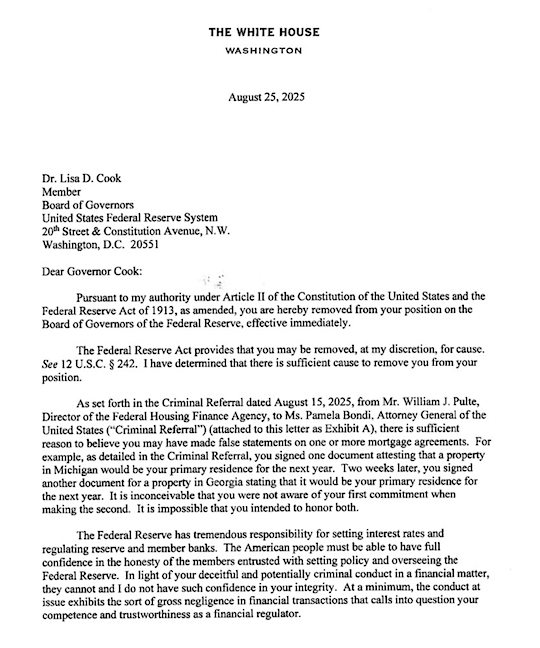Lisa Cook is, or was, a member of the Board of Governors of the Federal Reserve. President Trump wrote Cook a letter, firing her for cause, i.e., mortgage fraud. He announced the firing on Truth Social:
Rather than going quietly, Cook responded by suing Trump and others, alleging that grounds for her firing do not exist and asking for declaratory and injunctive relief to that effect. It alleges that Trump’s grounds for firing Cook are pretextual, and the firing is an attack on the Fed’s vaunted independence.
The Cook cases raises several issues. The Federal Reserve Act says that the president can fire a member of the Board of Governors for cause. There doesn’t seem to be any question about the fact that Cook committed mortgage fraud, although there has been no adjudication of the issue. She applied, almost simultaneously, for mortgages on properties in different states, alleging in each case that the property was her primary residence. Apparently this type of fraud is common among Democrats, as every Democrat I have seen quoted on the case says it is no big deal.
The central legal question is whether mortgage fraud is a cause that justifies termination under the Act. Cook and her supporters allege that the “cause” must be some misdeed relating to her job duties. The mortgage fraud preceded her service on the Board, and is not directly related thereto. Trump argues that the Fed directly impacts mortgages, and it is important that the public have faith in the integrity of members of the Board of Governors.
A second legal question is whether it is appropriate for a court to grant injunctive relief under these circumstances. Normally, if an employee is fired for cause, he or she departs. If the employee doesn’t think there was a proper basis for the firing, he or she can sue to collect damages. Cook brought her case in the Democrat-friendly District Court for the District of Columbia. Given the abandon with which Democratic Party district court judges have purported to enjoin Trump administration actions, it would not be surprising to see such relief granted in this case.
A third and more profound question lurks in the background. Under Article II of the Constitution, the president is the Executive Branch. The Supreme Court has held in at least two cases (see, e.g., Seila Law v. Consumer Financial Protection Bureau) that Congress cannot constrain the president’s ability to run the Executive Branch by establishing agencies whose heads can only be fired for cause:
Article II vests the entire “executive Power” in the President alone, but the Constitution presumes that lesser executive officers will assist the President in discharging his duties. The President’s executive power generally includes the power to supervise—and, if necessary, remove—those who exercise the President’s authority on his behalf. The President’s removal power has long been confirmed by history and precedent. It was recognized by the First Congress in 1789….
The Court has recognized two exceptions, where Congress can impose a “cause” requirement. One is the independent counsel statute; the second essentially describes the Fed:
Humphrey’s Executor permitted Congress to give for-cause removal protection to a multimember body of experts who were balanced along partisan lines, appointed to staggered terms, performed only “quasi-legislative” and “quasi-judicial functions,” and were said not to exercise any executive power.
Cook’s complaint relies heavily on Humphrey’s Executor, but that ruling has been so narrowed by later cases that many doubt whether it is still good law. If push comes to shove, would the Supreme Court hold that the “cause” requirement under the Federal Reserve Act is unconstitutional? It might well do so.
Thus far, the Trump administration has not pushed the point. It is notable that in the executive order that brought the “independent” federal agencies under presidential control, Trump specifically excepted the Fed:
This order shall not apply to the Board of Governors of the Federal Reserve System or to the Federal Open Market Committee in its conduct of monetary policy.
I don’t believe Trump and the other officials who were sued by Cook have yet responded to her complaint. It will be interesting to see whether those responses include a claim that the “cause” requirement in the Federal Reserve Act is unconstitutional, and Trump has unfettered power to fire Cook at will. I think it would be impolitic for Trump to make that argument, even though it may have legal merit, and I don’t think he will do so.
Meanwhile, another question, not directly at issue in the Cook lawsuit, is: what in the world was Lisa Cook doing on the Fed’s Board of Governors? To say that she was lightly qualified is an understatement. Apart from the mortgage fraud, plagiarism has been alleged in her academic work. And worse, incompetence:
The quality of her scholarship has also received criticism. Her most heralded work, 2014’s “Violence and Economic Activity: Evidence from African American Patents, 1870 to 1940,” examined the number of patents by black inventors in the past, concluding that the number plummeted in 1900 because of lynchings and discrimination. Other researchers soon discovered that the reason for the sudden drop in 1900 was that one of the databases Cook relied on stopped collecting data in that year. The true number of black patents, one subsequent study found, might be as much as 70 times greater than Cook’s figure, effectively debunking the study’s premise.
Of course, the idea that “lynchings and discrimination” began suddenly in 1900 is absurd on its face. Cook was evidently a DEI hire, and this kind of politicized “scholarship” is typical of what we see today from left-wing academics.
Cook has been part of the anti-Trump faction in the Fed. Anti-Trump, in this instance, means wanting to keep interest rates high. It is reasonable to suspect that if we had a Democratic president, Cook and others would be eager to cut interest rates. The battle over interest rates will continue, regardless of how the Cook case is resolved.


















